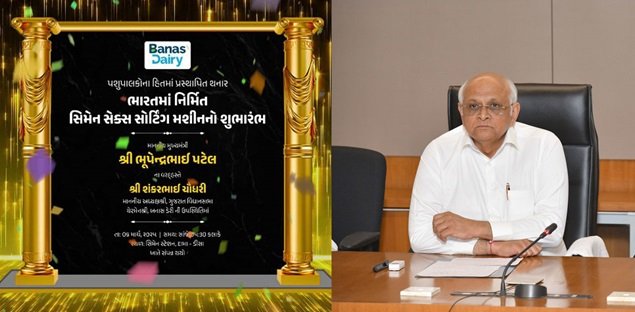Gujarat State CM virtually inaugurates Banaskantha Dairy Semen Center in Dama
Banaskantha Dairy’s Dama Semen Center to enable 90% female cattle births with advanced semen doses.
Bhupendra Patel, Chief Minister Gujarat State virtually inaugurated a modern semen production unit, set up by Banaskantha Dairy in Dama village, Deesa Taluka, Banaskantha, via video conferencing from Gandhinagar. This Make in India semen sex sorting machine aims to produce high-pedigree, high-milk-yielding animals for animal husbandry farmers, while also addressing the issue of stray cattle in Banaskantha district.
The Dama Semen Production Unit, operated by Banaskantha Dairy, spans 20 acres and stands as an A-grade semen station. It employs advanced scientific methods such as Genomics Breeding Value, Milk Yield Competition per Animal, Progeny Testing, and Pedigree Selection to identify and breed the best disease-free bulls and calves. As a result, approximately 25 lakh high-quality semen doses will be produced annually. With this cutting-edge technology, Banaskantha Dairy is set to bring a transformative revolution to the animal husbandry sector. Under the Make-in-India and Atmanirbhar Bharat initiatives, NDDB has developed the indigenous GauSort Technology-based Semen Sex Sorting Machine, now fully operational at the Dama Semen Station.
In his virtual address at the inauguration of the semen center, Chief Minister Bhupendra Patel said that the newly inaugurated semen center in Dama, Deesa, is set to bring immense benefits to animal husbandry farmers. As a result of various animal husbandry schemes initiated in Gujarat under the vision of Prime Minister Narendra Modi, milk production in Gujarat has increased by 119.62 lakh metric tons.
Addressing the event, Shankarbhai Chaudhary, Gujarat Legislative Assembly Speaker and Banaskantha Dairy Chairman, announced that the country’s first indigenous semen sorting center is now operational—a groundbreaking milestone for farmers. He expressed his gratitude to the scientists of NDDB (National Dairy Development Board) for developing this Make-in-India technology. With this facility, farmers can now access semen doses at just Rs 100. Given Banaskantha’s vast cattle population of over 28 lakh, genetic enhancement is crucial. The development of high-quality cattle semen is leading to superior offspring and increased milk production. Banaskantha Dairy has also made significant strides in embryo transplant technology, further advancing Prime Minister’s vision. Gujarat is experiencing a revolution in animal husbandry, with the globally acclaimed Amul cooperative model serving as a testament to its success.
Benefits of the Semen Center:
• This technology will help resolve the issue of stray cattle in Banaskantha.
• With this technology, 90 per cent of newborn cattle will be female, enabling dairy farmers to double their milk production in the future, thus doubling their income.
• Currently, the cost of semen dose production is Rs 730 per dose, which will be reduced to Rs 280, leading to a saving of Rs 450 per dose.
• At present, dairy farmers receive semen doses for Rs100 each, which will be further reduced to just Rs 50.
Banaskantha Dairy’s Dama Semen Center to enable



